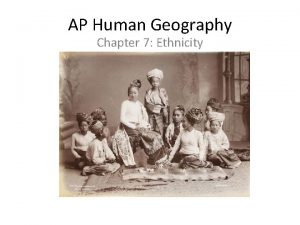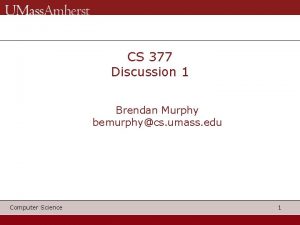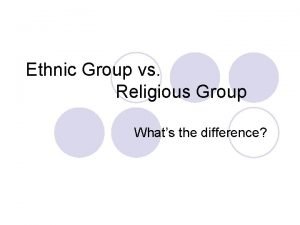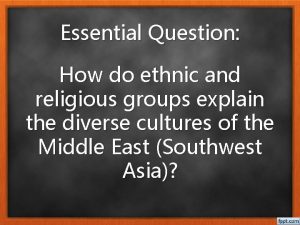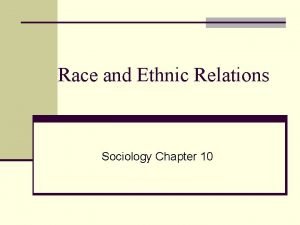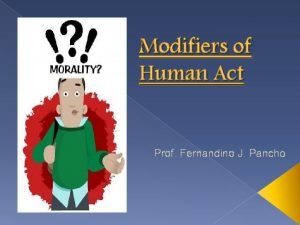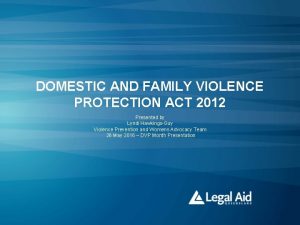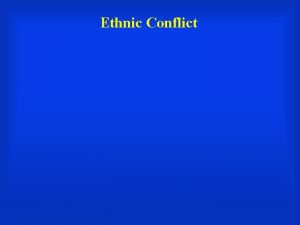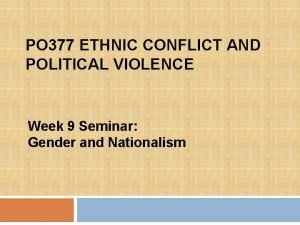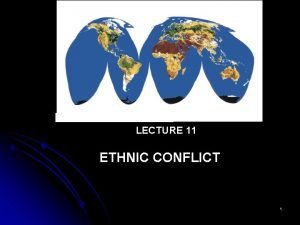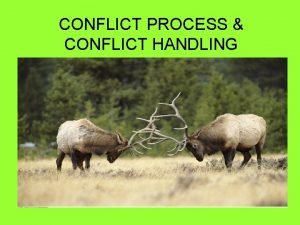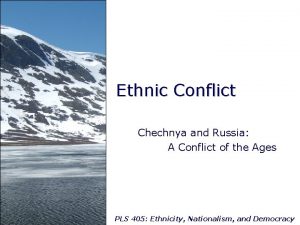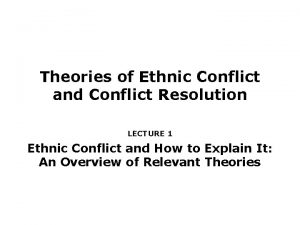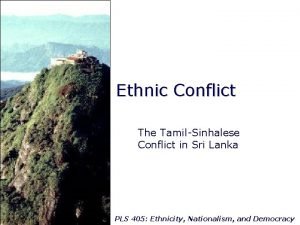PO 377 ETHNIC CONFLICT AND POLITICAL VIOLENCE WEEK





















- Slides: 21

PO 377 ETHNIC CONFLICT AND POLITICAL VIOLENCE WEEK 15 SEMINAR: INTERNAL FRAMEWORKS FOR MANAGING CONFLICT

Core Seminar Question Critically assess the potential of (consociational) power-sharing arrangements to prevent the outbreak or recurrence of violent ethnic conflict.

A quick quiz Answer the following questions (in groups if you prefer) within 10 minutes. Refer to readings where possible. 1. 2. 3. 4. 5. 6. What is a “political institution”? Why do the features of political institutions arguably have an impact on the prospects of ethnopolitical stability? Why, according to Lijphart, is majoritarian democracy not suitable for multiethnic societies? Do you agree? What is the purpose of power-sharing arrangements? What are the primary characteristics of consociationalism? In your own opinion, what is the biggest shortcoming of consociationalism? Do you think it is a suitable framework for managing conflict?

Question 1: What is a “political institution”? A: Political institutions are enduring structures which shape political interactions, and whose properties are in turn based on repetitive or frequently occurring human interactions. (See North 1990 and Crawford & Ostrom 1995).

Question 2: Why do the features of political institutions arguably have an impact on the prospects of ethnopolitical stability? A (i): Because they structure political behaviour and, in doing so, have an impact on the socioeconomic and cultural-ideological conditions of society (March and Olsen 1984). A (ii): Because the features of political institutions determine who will hold power and have access to resources that are controlled by the state (ibid. ).

Question 3: Why, according to Lijphart, is majoritarian democracy not suitable for multiethnic societies? Do you agree? A: According to Lijphart, the core problem of majoritarianism (i. e. institutional design that relies on “winner-takes-all” principles) is its potential for “majority dictatorship” (Lijphart 1985: 102) and the permanent exclusion of minorities: “Simply put, simple majority rule results in minimum winning coalitions that tend to exclude a significant minority; when minority preferences are intense and there is little chance of the minority becoming a majority, a recipe for conflict exists” (Sisk 1996: 32).

Question 4: What is the purpose of power-sharing arrangements? A: Power-sharing arrangements are supposed to overcome the risks for ethnopolitical stability arguably inherent to majoritarian democracy. Their aim is to increase the inclusivity of the political system more generally, and to ensure that the representatives of all major ethnic groups in society are included in the political decision-making process more specifically. (See Rothchild and Roeder 2005 or Sisk 1996. )

Question 5: What are the primary characteristics of consociationalism? A: Sharing of executive power and group autonomy. Proportionality and mutual veto are secondary characteristics.

Grand coalition Elites of each pillar come together to rule in the interests of society because they recognize the dangers of non-cooperation. Mutual veto Consensus among the groups is required to confirm the majority rule. Mutuality means that the minority is unlikely to successfully block the majority. If one group blocks another on some matter, the latter are likely to block the former in return. Proportionality Representation is based on population. If one pillar accounts for 30% of the overall society, then they occupy 30% of the positions on the police force, in civil service, and in other national and civic segments of society. Segmental autonomy Creates a sense of individuality and allows for different culturally-based

Question 6: In your own opinion, what is the biggest shortcoming of consociationalism? Do you think it is a suitable framework for managing conflict? A: Up to you! Some of the main criticisms against consociationalism are: 1. 2. 3. that it is too elite-centred (Daalder 1974, Horowitz 2002 etc. ); that it lacks incentives for inter-ethnic compromise, freezes group boundaries in the political system and cements ethnic cleavages (Horowitz 2000; Reilly 2002; Sisk 1996 etc. ); that it is arguably undemocratic (see Lijphart 2002).

Group work Ø Split into four different groups, depending on whether you want to focus on Northern Ireland or Rwanda, and whether you are in favour of or against (consociational) power-sharing arrangements as an internal framework for managing conflict. Answer the questions on the next slide. (Bosnia with the Dayton Agreement is another example but is more complex due to the federal and confederal territorial structure in addition to central power-sharing arrangements. )

Group work Answer the following questions: 1. 2. 3. Think about what you consider to be the main causes of ethnic violence (e. g. tensions over resource distribution, colonial legacies, discrimination, elite manipulation etc. ). Bearing these factors in mind, do you think that institutional design can help prevent the outbreak or recurrence of ethnic violence? Do you think that assured participation in the political decision-making process helps more to prevent ethnic violence (as Lijphart would argue) or that it in fact freezes ethnic identities and inter-ethnic tensions in the political system (as Horowitz would say)? Under which conditions can consociationalism work (if it can work at all)?

Power-sharing in two case studies Power-sharing in Rwanda according to the 1993 Arusha Accords: power-sharing at the level of the executive; (quasi-) proportionality in parliament and within the armed troops; Consociationalism in Northern Ireland according to the 1998 Agreement: cross-community executive power-sharing (e. g. election rules for First Minister and deputy First Minister); proportionality rules throughout the governmental and public sectors; autonomy/community self-government; veto rights for minorities (e. g. through procedures of parallel consent).

Peace and democratic stability following the power-sharing arrangements? Rwanda: 1994 genocide; no transition to democracy; note that post-genocide attempts for executive power-sharing arrangement failed and current majoritarian system is weakly democratic, quite authoritarian. Northern Ireland: more sporadic incidences of violence; ongoing/increased incidents of inter-communal localised violence; numerous suspensions of devolved institutions; note that 1973 power-sharing executive (Sunningdale Agreement) had collapsed in 1974.

Since the signing of the Good Friday Agreement in 1998, Northern Ireland is largely self-governing. According to the agreement, Northern Ireland co-operates with the Republic of Ireland on some policy areas, while other areas are reserved for the British Government, though the Republic of Ireland "may put forward views and proposals" with "determined efforts to resolve disagreements between [the two governments

Northern Ireland was created in 1921, when Ireland was partitioned between Northern Ireland Southern Ireland by an act of the British parliament. Unlike Southern Ireland, which would become the Irish Free State in 1922, the majority of Northern Ireland's population were unionists or loyalists, who wanted to remain within the United Kingdom. Most of these were the Protestant descendants of colonists from Great Britain; however, a significant minority, mostly Catholics, were nationalists or republicans who wanted a united Ireland independent of British rule

Today, the former generally see themselves as British and the latter generally see themselves as Irish; some people from both communities describe themselves as Northern Irish. Historically, Northern Ireland was marked by discrimination and hostility between these two communities In the late 1960 s, conflict between the two communities, and involving state forces, erupted into three decades of violence known as the Troubles

The Good Friday Agreement in 1998 was a major step in the peace process although sectarianism and religious segregation still remain major social problems. 48% of the population came from a Protestant background, 45% from a Catholic background

Conditions to make consociationalism work according to Lijphart (1977) 1. 2. 3. 4. 5. 6. A multiple balance of power among the segments of society; small size of the country involved; overarching loyalties; segmental isolation (territorial or social); prior tradition of elite accomodation; the presence of crosscutting cleavages.

Why did the Arusha Accords fail? (Lemarchand 2006) Possible explanations: Exclusion of pro-Hutu CDR extremists from negotiating process; rise of Hutu Power after killing of Melchior Ndadaye (first Hutu President of Burundi, assassinated in Oct. 1993); lack of trust between crucial negotiating parties; civil war context (anxieties, suspicions and strong external pressure at the negotiating table).

Northern Ireland following the 1998 Agreement – a “complex consociation” According to O’Leary (2001) “complex consociations” are complex, because they: address specifically national self-determination disputes between communities; simultaneously involve peace processes; involve at least one additional strategy other than consociation; are characterised by international involvement in the making, ratification and maintenance of the relevant consociational settlements.
 Blockbusting ap human geography definition
Blockbusting ap human geography definition Cs377 umass
Cs377 umass Portaria 377/2008
Portaria 377/2008 Sid377
Sid377 Who discovered roentgenograms
Who discovered roentgenograms Pms 377
Pms 377 Week by week plans for documenting children's development
Week by week plans for documenting children's development A struggle between a character and an outside force
A struggle between a character and an outside force What is conflict and conflict resolution?
What is conflict and conflict resolution? Internal conflict definition
Internal conflict definition Chapter 10 racial and ethnic relations review worksheet
Chapter 10 racial and ethnic relations review worksheet Ethnic studies and postcolonial criticism
Ethnic studies and postcolonial criticism Chapter 10 racial and ethnic relations
Chapter 10 racial and ethnic relations Ethnocentric curriculum
Ethnocentric curriculum Whats an ethnic group
Whats an ethnic group How are ethnic groups and religious groups related
How are ethnic groups and religious groups related Chapter 10 racial and ethnic relations review worksheet
Chapter 10 racial and ethnic relations review worksheet Modifiers of human acts summary
Modifiers of human acts summary Domestic and family violence protection act 2012
Domestic and family violence protection act 2012 Gandhi king and mandela what made non-violence work dbq
Gandhi king and mandela what made non-violence work dbq Chapter 9 resolving conflicts and preventing violence
Chapter 9 resolving conflicts and preventing violence Chapter 27 anger aggression and violence
Chapter 27 anger aggression and violence
